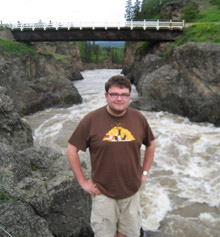West Coast Environmental Law (WCEL)
 As a June Callwood Program in Aboriginal Law 2010 fellow I thoroughly enjoyed my summer working at West Coast Environmental Law (WCEL) in Vancouver, where I had the opportunity to pursue my interests in aboriginal rights and the environment. WCEL is a small legal-environmental public interest organization that has been advocating for progressive environmental laws in BC and Canada for decades.
As a June Callwood Program in Aboriginal Law 2010 fellow I thoroughly enjoyed my summer working at West Coast Environmental Law (WCEL) in Vancouver, where I had the opportunity to pursue my interests in aboriginal rights and the environment. WCEL is a small legal-environmental public interest organization that has been advocating for progressive environmental laws in BC and Canada for decades.
I was fortunate enough to work on a wide variety of assignments this summer. I wrote summaries and memos explaining recent developments in environmental-aboriginal law jurisprudence, delved into cutting-edge questions of jurisdiction for First Nations human rights claims under international law, drafted documents used in First Nations land claims negations with the Crown, pieced together oral histories establishing indigenous territory, and even wrote a hard-hitting post for WCEL's law blog. Much of my time this summer was spent doing research for the Indigenous Environmental Law Project, which will help First Nations articulate their traditional environmental laws in our modern legal system.
Outside the office I watched the courtroom proceedings of a Vancouver Island First Nation defending its water source, attended a conference on BC's energy export policy, witnessed Vancouver City Council deliberate over the continued presence of oil tankers in the city's waters, participated in community and environmental NGO strategy meetings, and did a bit of public outreach legal education. A huge highlight of the summer was travelling to Northern BC on assignments; once for a community solidarity gathering in Kitimaat and a second time helping a First Nations group develop its strategic land use plan. These trips opened my eyes to the beauty and struggles of northern life, its unique considerations, and legal issues.
Working at WCEL was fantastic. In addition to sharpening my legal research and writing skills, I benefited tremendously from spending time with aboriginal, environmental, and natural resources lawyers in a professional context. I really enjoyed the variety and unpredictability of working at a legal NGO. I am very intrigued by the important role the law and lawyers can play in public interest coalitions, and how a legal approach to a complex problem can often be the best one (or the worst). Most of all, I am grateful for the wonderful connections I made, and the valuable experience I gained in aboriginal and environmental law in such a dynamic jurisdiction. Thank you so much to Pro Bono Students Canada and the June Callwood Program in Aboriginal Law for this excellent opportunity.

 As a June Callwood Program in Aboriginal Law 2010 fellow I thoroughly enjoyed my summer working at West Coast Environmental Law (WCEL) in Vancouver, where I had the opportunity to pursue my interests in aboriginal rights and the environment. WCEL is a small legal-environmental public interest organization that has been advocating for progressive environmental laws in BC and Canada for decades.
As a June Callwood Program in Aboriginal Law 2010 fellow I thoroughly enjoyed my summer working at West Coast Environmental Law (WCEL) in Vancouver, where I had the opportunity to pursue my interests in aboriginal rights and the environment. WCEL is a small legal-environmental public interest organization that has been advocating for progressive environmental laws in BC and Canada for decades.